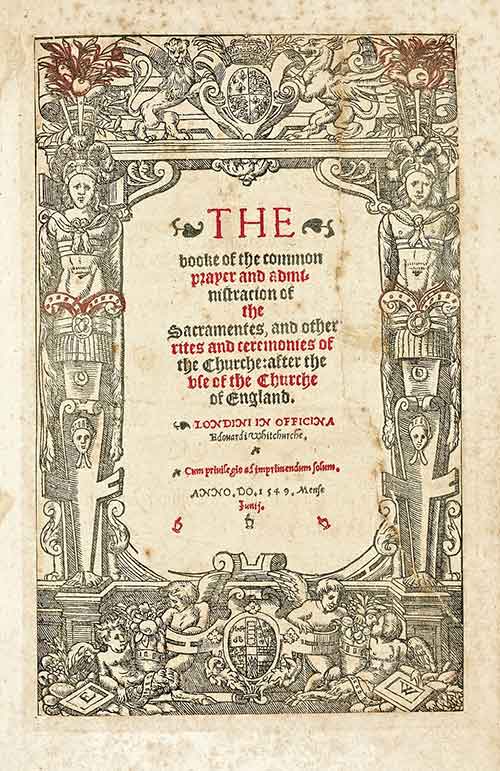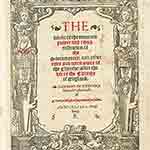
In The Book of Common Prayer of The Episcopal Church, the Calendar (page 23) has that a celebration of “The First Book of Common Prayer, 1549, is appropriately observed on a weekday following the Day of Pentecost.” Today, on this site, is that day.
Almighty and everliving God, whose servant Thomas Cranmer, with Others, restored the language of the people in the prayers of your Church: Make us always thankful for this heritage; and help us so to pray in the Spirit and with the understanding, that we may worthily magnify your holy Name; through Jesus Christ our Lord, who lives and reigns with you and the Holy Spirit, one God, for ever and ever.
The Act of Uniformity was passed on 21 January 1549. And the Book of Common Prayer changed Latin to English (the vernacular) on the Day of Pentecost, 9 June, 1549. Interestingly, the Day of Pentecost this year (470 years later) also fell on the 9th of June! Also of interest, Roman Catholicism followed the Church of England’s shift to the vernacular 420 years later.
You can read the BCP1549 online here.
1549’s Book of Common Prayer drew from the Sarum Rite (the liturgy developed in Salisbury), and from the work of Cardinal Quiñones and Hermann von Wied, Archbishop of Cologne. There was also the influence of Eastern Orthodoxy and the new Lutheran order of service. Had the principle of the vernacular been taken seriously, to the point of having produced a Gaelic version at the same time, the history of Ireland (etc) might be very different, rather than the BCP being seen as central to the attempt to impose English on Ireland.
Whereof the king and his council … appoint the archbishop of Canterbury, with certain of the best learned and discreet bishops and other learned men, diligently to consider and ponder the premises; and thereupon, having as well an eye and respect unto the most sincere and pure Christian religion taught by the Holy Scriptures, as also to the usages of the primitive church, to draw and make one convenient and meet order, rite, and fashion of Common Prayer, and administration of the sacraments, to be had and used within this his realm of England, and the dominions of the same; who, after most godly and learned conferences, through the aid of the Holy Ghost, with one uniform agreement did conclude, set forth, and deliver unto the king’s Highness, a book in English, entitled, A Book of the Common Prayer and Administration of the Sacraments, and other rites and ceremonies of the Church, after the use of the Church of England.
THE ACTS AND MONUMENTS OF THE CHRISTIAN CHURCH by JOHN FOXE
In New Zealand’s Anglican Church of Or, we may again need a Cranmer to help us “make one convenient and meet order, rite, and fashion of Common Prayer”. We have commodified God. Denominations, parishes, and different services within parishes are the supermarket chains of Christianity, touting the commodified God to fulfil our individual needs – real, perceived, or manufactured. The vision of all in earth and heaven standing around God’s one table is not even an ideal seeming to be striven for…
And Cranmer’s Preface, critiquing what he was correcting, is still true:
many times there was more busines to fynd out what should be read, then to read it when it was faunde out.
Preface BCP1549
I know of clergy who have suffered breakdowns over the incessant idolising of innovation. It is the contemporary version of Cranmer’s point: Far more time and energy is spent in preparing for some small parts of worship (in making sure this worship experience is different from that worship experience) than in actually using that in worshipping!
And where heretofore, there hath been great diversitie in saying and synging in churches within this realme: some folowyng Salsbury use, some Herford use, same the use of Bangor, some of Yorke, and some of Lincolne: Now from hencefurth, all the whole realme shall have but one use.
Preface BCP1549
And when it comes to the rules in our Church, again, may a new Cranmer arise. Our Church’s rules are firstly hard to find, and, secondly, once found they are nearly impossible to agree about – as is found again and again when, even at the highest level, people either disagree about what the rule means, or should they finally end up agreeing, find that the rule has been disobeyed, again to the highest levels, sometimes for decades*:
Yet, because there is no remedy, but that of necessity there must be some Rules; therefore certain Rules are here set forth; which, as they are few in number, so they are plain and easy to be understood.
CONCERNING THE SERVICE OF THE CHURCH
[*Our Church’s complex system of “authorising experimental services” springs immediately to mind – there was no such provision, and it was contrary to the Act of Parliament which ties property and funds to the people who follow our agreed beliefs and actions! Having finally agreed to this “error”, our Church rushed through to have as formularies material that was written to be experimental for some period followed by revision.]
If you appreciated this post, consider liking the liturgy facebook page, using the RSS feed, and/or signing up for a not-very-often email, … if you are on Instagram, please follow @liturgy.



